Arms
 |
|
The Worshipful Company of Turners is one of the Livery Companies of the City of London.
The Turners' Company is one of the oldest Livery Companies in the City of London. Its origins go back to early medieval times: the first reference to a London turner dates to 1189, though the charter is dated 1155. [1] The medieval Company was a trade guild, set up to protect the interests of its members, whose skill was to turn and shape wooden objects on a lathe. They laid down standards for their products; they had a strict system of apprenticeship; they restricted competition from outsiders; and they collected for charity and funeral expenses. Unlike the richer Livery Companies the Turners were craftsmen, not merchants. Yet at a time when many everyday necessities, like chairs, cups and plates, were turned products, successful London turners could make a good living by the standards of the day.
The contemporary Turners' Company reflects many of the traditions of earlier days. Its main objective remains to promote the craft of turning, which, in the 21st century, encompasses a broad spectrum of styles from the traditional and practical to the intricate and ornate right through to large statement pieces and avant garde works of art. Both professional turners and amateurs are members of the Company.
The Company promotes the craft of turning by running a major exhibition, known as "Wizardry in Wood", every four years. It holds turning competitions, and offers prizes and bursaries to established and aspirant turners. It supports the Register of Professional Turners, which gives details of leading turners and what they make.[ citation needed ]
The Company received its royal charter from King James 1st in 1604, and is 51st in the order of precedence of City Livery Companies.
The company motto is By Faith I Obteigne, or, in Modern English, By Faith I Obtain.
 |
|
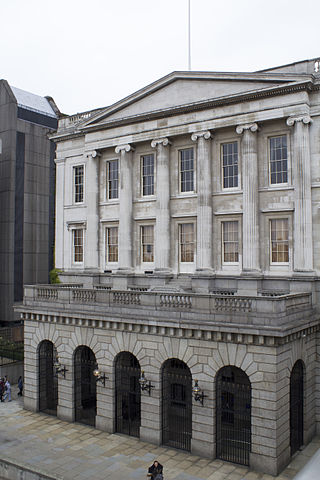
A livery company is a type of guild or professional association that originated in medieval times in London, England. Livery companies comprise London's ancient and modern trade associations and guilds, almost all of which are styled the "Worshipful Company of" their respective craft, trade or profession. There are 111 livery companies in total. They play a significant part in the life of the City of London, not least by providing charitable-giving and networking opportunities. Liverymen retain voting rights for the senior civic offices, such as the Lord Mayor, Sheriffs and Common Council of the City Corporation, London's ancient municipal authority with extensive local government powers.

The Worshipful Company of Goldsmiths, is one of the Great Twelve Livery Companies of the City of London, headquartered at Goldsmiths' Hall, London EC2.
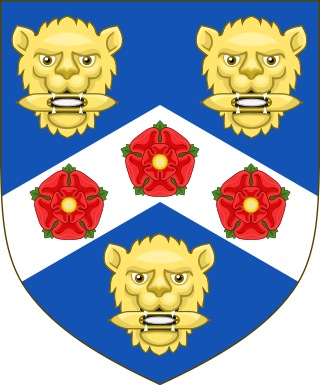
The Worshipful Company of Weavers is the most ancient of the Livery Companies in the City of London. It existed in the year 1130, and was perhaps formed earlier. The company received a Royal Charter in 1155. At present, the Company retains a connection to textiles through its contributions to the textile industry. It has, however, like most other Livery Companies, evolved into a charitable institution rather than remaining a trade association.

The Worshipful Company of Glovers is one of the ancient Livery Companies of the City of London. Glovers separated from the Cordwainers to form their own organisation in 1349 and received a Royal Charter of incorporation in 1639. The company is, as are most other Livery Companies, a charitable organisation, but it still retains close links to its original trade.

The Worshipful Company of Masons is one of the ancient Livery Companies of the City of London, number 30 in the order of precedence of the 111 companies. It was granted Arms in 1472, during the reign of King Edward IV; its motto is “God Is Our Guide”.

The Worshipful Company of Cooks of London is the smallest of the Livery Companies of the City of London. The Company received its first and incorporating Royal Charter from Edward IV on 11 July 1482. Its Royal Charter of 16 February 1663, from Charles II, is the present day governing ordinance for the Company.

The Worshipful Company of Coopers is one of the livery companies of the City of London. The organisation of coopers existed in 1422; the Company received its first royal charter of incorporation in 1501. The cooper trade involved the making of wine, beer, and spirit casks ; the Livery Company also functions as a charitable foundation, and supports two education establishments: the Coopers' Company and Coborn School of Upminster, Essex, and Strode's College of Egham, Surrey. The former was founded in the Ratcliffe area of London in 1536 and donated to the Company who have been involved with it ever since.
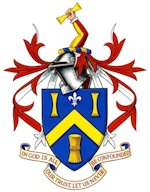
The Worshipful Company of Tylers and Bricklayers is one of the livery companies of the City of London. The organisation of Tylers and Bricklayers existed in 1416; it was incorporated by a royal charter in 1568. Originally, the company possessed a monopoly over bricklaying within the City of London. However, after the Great Fire of London, the king decreed that brick or stone, instead of timber, should be used as the main supporting structure of buildings. There was too much rebuilding to be done by only the Tylers' and Bricklayers' Company; craftsmen from across England were summoned, and the monopoly was terminated. The company now exists, along with most livery companies, primarily as a charitable body. The company also supports various building schools.
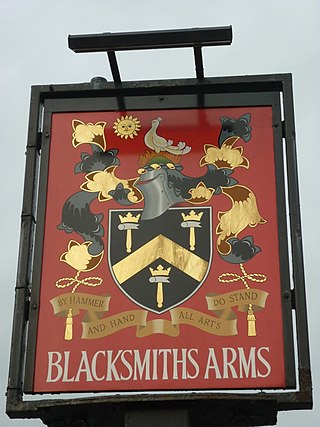
The Worshipful Company of Blacksmiths ranks fortieth among the ancient livery companies of the City of London.
The Worshipful Company of Broderers is one of the livery companies of the City of London. Broderers were workers in embroidery; the organization of Broderers existed in at least 1376, and was officially incorporated by a royal charter in 1561. As the craft of embroidery has lost its importance as a trade, the company has become less of a trade association for broderers. Instead, the company is now, as are most livery companies, a charitable foundation.

The Worshipful Company of Upholders is one of the Livery Companies of the City of London. "Upholder" is an archaic word for "upholsterer". In past times, upholders did not just manufacture and sell upholstered goods but were cabinet makers, undertakers, soft furnishers, auctioneers, and valuers. The organisation was formed on 1 March 1360 and officially incorporated by a Royal Charter granted by Charles I in 1626. The Company originally had the right to set standards for upholstery within London and to search, seize and destroy defective upholstery. However, over the years, the Company's power has eroded, as has the profession of upholsterers, because of the advancement of technology.
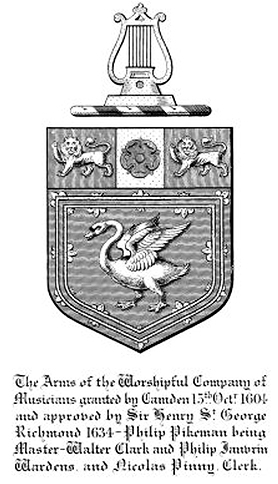
The Worshipful Company of Musicians is one of the Livery Companies of the City of London. Its history dates back to at least 1350. Originally a specialist guild for musicians, its role became an anachronism in the 18th century, when the centre of music making in London moved from the city to the West End, and for more than a century it was a general guild for figures in the city, with no specific musical role. In the late 19th century, the musical element was revived, and the modern Company promotes all aspects of the art and science of music.
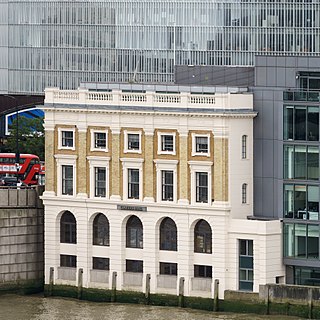
The Worshipful Company of Glaziers and Painters of Glass is one of the livery companies of the City of London. The Guild of Glaziers, or makers of Glass, the company's forerunner, existed as early as the fourteenth century. It received a royal charter of incorporation in 1638. It is no longer a trade association of glass craftsmen, instead existing, along with a majority of livery companies, as a charitable body.
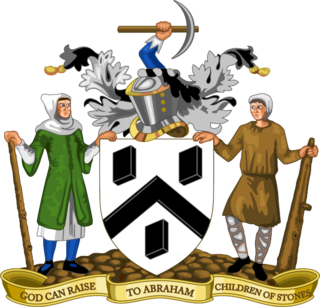
The Worshipful Company of Paviors is one of the livery companies of the City of London. The Paviors can trace their history back to medieval times; they were responsible for the paving and maintenance of London's streets. It received a Royal Charter from Queen Elizabeth II in 2004. The company is no longer a trade association for or a regulator of London's road constructors. Today, it focuses on the promotion of excellence in all areas of construction.

The Worshipful Company of Clockmakers was established under a Royal Charter granted by King Charles I in 1631. It ranks sixty-first among the livery companies of the City of London, and comes under the jurisdiction of the Privy Council. The company established a library and its museum in 1813, which is the oldest specific collection of clocks and watches worldwide. This is administered by the company's affiliated charity, the Clockmakers' Charity, and is presently housed on the second floor of London's Science Museum. The modern aims of the company and its museum are charitable and educational, in particular to promote and preserve clockmaking and watchmaking, which as of 2019 were added to the HCA Red List of Endangered Crafts.

The Worshipful Company of Chartered Accountants in England and Wales is one of the livery companies of the City of London. They were one of the earliest of the modern livery companies promoted by the Court of Aldermen from the 1970s, receiving a Grant of Letters Patent in 1977 and receiving a Royal Charter in 2012. The Company is complementary to, and supported by, the Institute of Chartered Accountants (ICAEW). It promotes "honourable practice" of accounting and awards prizes to students in the field. It also supports general charities. The company ranks eighty-sixth in the order of precedence for livery companies. Its motto is True and Fair.
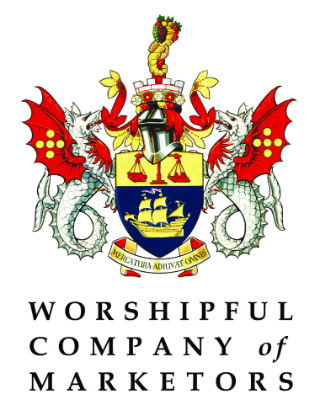
The Worshipful Company of Marketors is one of the 111 livery companies of the City of London. The company was founded in 1975.
The Worshipful Company of Constructors is one of the Livery Companies of the City of London. The Company aims to bring together those professionally qualified individuals concerned with aspects of building design, execution, management, vision and economic appraisal.

The Worshipful Company of Security Professionals (WCoSP) is the 108th Livery Company of the City of London. It is a non-profit making organisation providing education and health services to members of the security profession.

Onesimus Ustonson was an English manufacturer of fishing tackle. He invented the multiplying reel, and supplied fishing tackle to the naturalist Joseph Banks for the second voyage of James Cook, 1772–1775. The firm of Ustonson went on to become Royal Warrant holders to three successive British monarchs.
1155 Charter - Worshipful Company of Weavers. The oldest recorded City Livery Company.